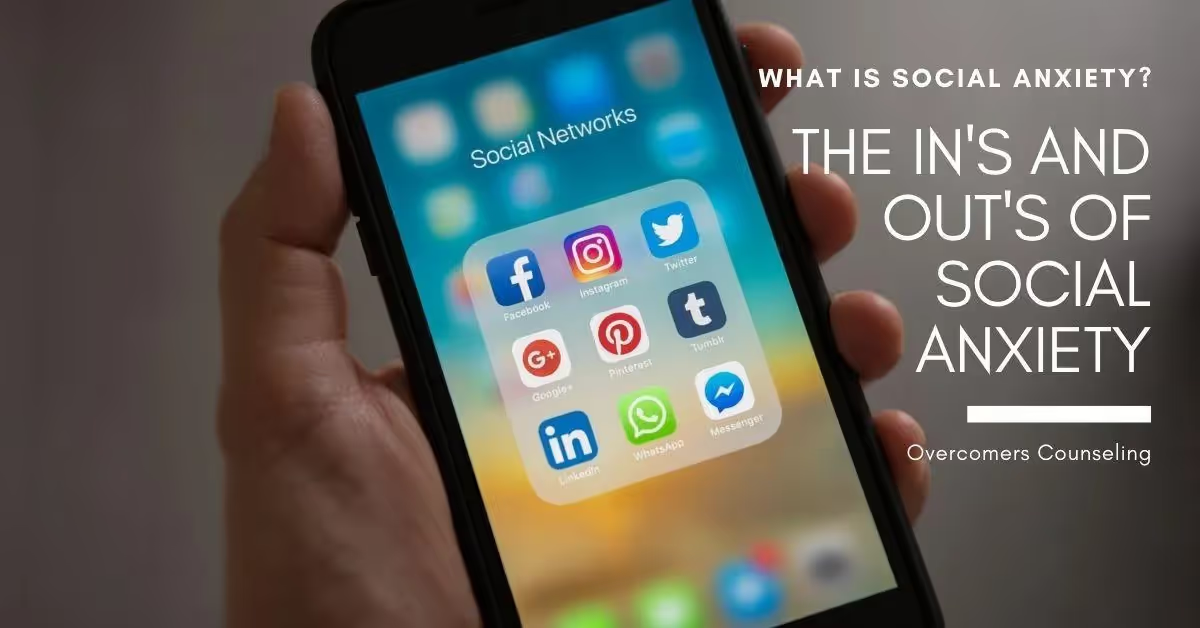Find out what is social anxiety is and what it means to you?Social anxiety disorder is a mental health condition characterized by an excessive fear of...

Find out what is social anxiety is and what it means to you?
Social anxiety disorder is a mental health condition characterized by an excessive fear of social situations. Individuals who suffer from social anxiety disorder may find themselves afraid of common social situations that occur at school, work, and leisure time. They may find it very difficult to talk on the phone, or to strike up a conversation with strangers. Likewise, they often have trouble making new friends or establishing romantic relationships. Those with social anxiety disorder typically have an overwhelming fear of being criticized or judged, and will often go to great lengths to avoid any perceived chance of this happening.
Social anxiety disorder is caused by both environmental and genetic factors.
While the precise genetic factors at play in social anxiety disorder are not yet fully understood, it is believed that the amygdala, or the "fear center" of the brain, is the primary culprit in the onset of social anxiety disorder symptoms.
As with most other anxiety disorders, an overactive amygdala can make an individual hypersensitive to any form of perceived risk in their environment. When these anxious reactions interfere with normal livelihood, an individual is then defined as suffering from an anxiety disorder.
Social anxiety disorder is also determined in great part by environment. Negative experiences, such as bullying, trauma, or abuse, can all contribute to the development of social anxiety disorder. Given the complex causes of social anxiety disorder, treatment and prognosis varies somewhat from individual to individual.
Symptoms of Social Anxiety Disorder
Social anxiety disorder is similar to other anxiety disorders, such as Generalized Anxiety Disorder and Panic Disorder, although symptoms tend to focus around social interaction and its potential repercussions, as its name would imply. While it is normal to feel some level of nervousness around social interaction, social anxiety becomes clinically significant when it interferes with an individual's ability to function. If you or someone you love is demonstrating any of these symptoms, it may be indicative of social anxiety disorder:
Treatment for social anxiety disorder, as with most other anxiety disorders, comes in two primary forms: talk therapy or medication.
Both forms of therapy have been shown to be effective in the treatment of social anxiety disorder, although the form of therapy that is best for you can only be determined with the help of a doctor.
Talk therapy involves guided therapeutic modalities led by a trained mental health professional who will help you reassess your feelings and learn to behave in a higher functioning way. For social anxiety disorder in particular, exposure therapy can help you build a tolerance to your anxious triggers by gradually exposing you to increasing levels of them. Done with proper guidance, this is an incredibly effective way of overcoming social anxiety disorder. When attempted without guidance, however, it can have the opposite effect, reinforcing anxious feelings and setting the patient back. Other forms of therapy, such as cognitive-behavioral therapy, can help you recognize irrational or unhelpful thoughts and reframe them in a way that helps you to better function.
Many people find that medication can be helpful as well, although this form of treatment often comes with side effects. Antidepressants, despite their name, have been shown to be highly effective in combating anxiety disorders as well as depression, and for patients with both conditions, they may be an ideal choice. Other anti-anxiety drugs are well known to be extremely helpful in the short-term, although their use must be carefully monitored, due to their addictive nature.
Always consult with your doctor about the downside and upsides of any medication.
Whichever form of treatment is right for you, there is hope.
Social anxiety disorder is one of the most treatable mental health conditions out there, with the majority of those who seek treatment finding their symptoms in remission with time. Only a trained professional can guide you on the path towards treatment, however. If you believe you may be struggling with social anxiety disorder, don't wait. Reach out and get the help you need.
A cheating narcissist is an individual who possesses narcissistic traits and engages in infidelity. They often display an inflated sense of self-importance, poor impulse control, and use manipulation tactics to maintain relationships while pursuing other romantic or sexual interests.
According to research, narcissistic personality disorder (NPD) is found in approximately 4.8% of females.
Resolving conflict with a narcissist can be challenging due to their manipulation tactics. However, establishing healthy boundaries and not feeding into their need for control can help. It's important to prioritize your own needs and not let the narcissist emotionally abuse you.
There are many different kinds of narcissists, but the six main types are The Narcissistic Victim, The Covert Narcissist, The Malignant Narcissist, The Exhibitionist Narcissist, The Somatic or Cerebral Narcissist, and The Toxic Parent.
Dealing with a narcissistic sibling can have severe effects on mental health. The constant emotional abuse can lead to issues like anxiety, depression, and low self-esteem. It's important to seek support for your emotional well-being, which might include seeking therapy.
Narcissists often engage in manipulative behaviors to maintain control and may show little consideration for their partner's feelings. If you're in a romantic relationship with a narcissistic woman, consider seeking professional advice. A mental health professional can provide guidance on how to navigate such a relationship and help determine whether it's possible to establish a healthier dynamic.